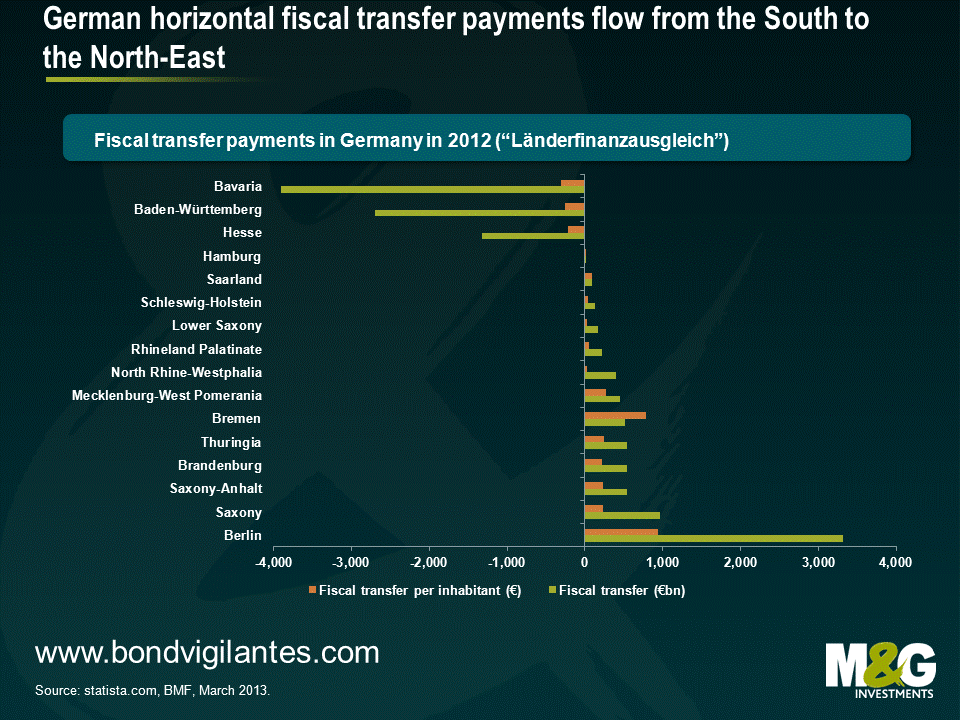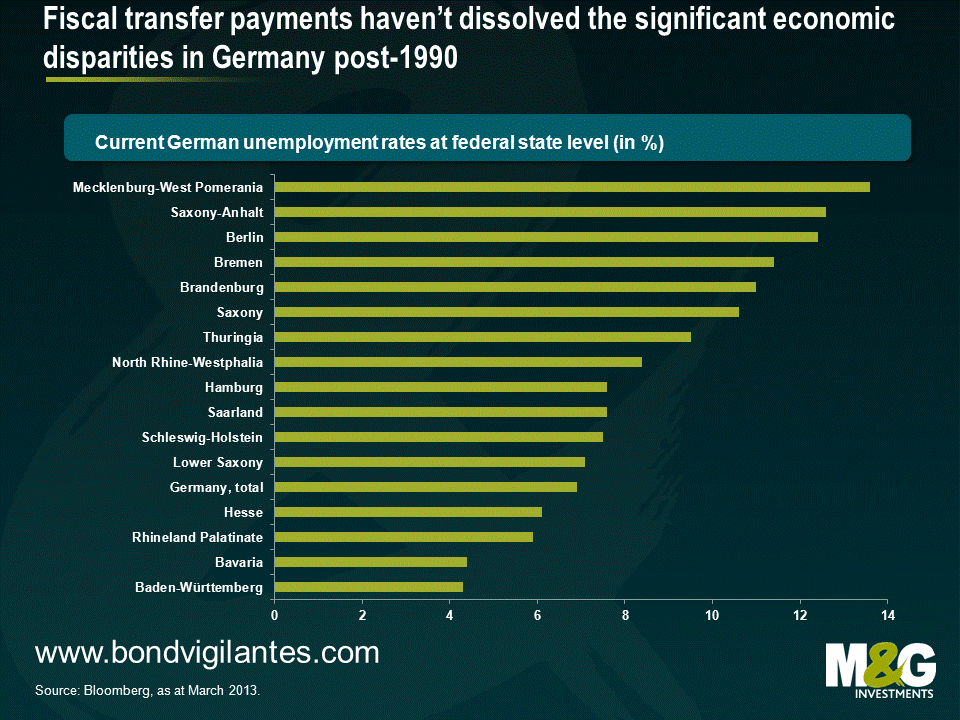Germany doesn’t like its own fiscal union, so why would it ever agree upon a European one?
If I asked you how the structural problems of the Eurozone may be resolved, I am sure that the suggestion of a fiscal union in which transfer payments will be made by the “rich” Northern member states to the “poor” ones in the South of Europe would rank amongst the top answers. I’ve been wondering for a while if the member states could ever agree upon major fiscal transfer payments and if it would indeed lead to greater degree of convergence within the Eurozone. I feel that we have come closer to an answer to my questions this week. And I am not referring to the issues around Cyprus.
Yesterday the German federal states Hesse and Bavaria filed a lawsuit against the existing mechanism of fiscal transfer between the federal states of Germany, the so-called “Länderfinanzausgleich”. The German constitution states that the objective of this fiscal transfer mechanism is the convergence of the financial power across its federal states. The current system consists of vertical payments between the German state (“Bund”) and the federal states (“Länder”) as well as horizontal payments from federal state to federal state. The eligibility for transfer payment receipts is determined by an index (“Finanzkraftmesszahl”) which indicates the relative financial power of the federal states. Bavaria, Baden-Württemberg and Hesse are currently the only net contributors, while Berlin is the biggest net recipient of these fiscal transfers.
Bavaria and Hesse argue that the current mechanism does not create any incentives for the net recipients to improve their financial position. It is said that sanctions for fiscal mismanagement are missing, while the net contributors are discouraged to consolidate their finances further as long as they have to redistribute their wealth. Basically, one rich German state is arguing why it should transfer its fiscal revenues to a poor (and arguably irresponsible) German federal state. If you already see significant opposition against a redistribution mechanism of wealth within a country, how is it possible to picture Germany, the Netherlands or Finland agreeing on major fiscal transfer payments to Southern Europe? Furthermore, the implication here is that the German Constitutional Court will have to decide if a stricter central enforcement of fiscal discipline has to be institutionalised and which set of sanctions can possibly be introduced to do so. Could you see anything like this to be enacted in the Eurozone in the near future, including lawsuit files from Germany, the Netherlands and Finland in response to any agreement as well as the subsequent court rulings on national and European level? In this context, it might be worth noting that the German Constitutional Court indicated last year that any further European integration, e.g. fiscal union, would require a referendum. Ultimately, German taxpayers might get to decide whether they want their tax payments to be transferred to other parts of Europe.
There remains the question about the potential long-term effect of a fiscal union. Would fiscal transfer payments from the North to the South lead to economic and social convergence in Europe? In Germany, fiscal transfers from the South to the North-East have certainly helped these federal states to converge in terms of their financial power and standard of living since the German unification in 1990. Nevertheless, after 23 years of fiscal transfer payments, the economic situation in these states remains highly unequal. For instance, the German unemployment rate varies significantly across federal states. While the unemployment rate in Mecklenburg-West Pomerania stands at around 14%, it is nearly as low as 4% in Bavaria and Baden-Württemberg. And the historic ties of companies, the geographical location and different geostructural fundamentals, infrastructure disparities, qualitative differences between educational and research institutions and many other factors might prevent them to ever fully converge.
This is the crux of the Eurozone matter for me. Only if we accept the fact that full convergence and homogeneity in Europe will not be achievable – even within a fiscal union – we may become sufficiently pragmatic to deal with the Eurozone issues. We might finally arrive at the conclusion that we could be able to improve the economic prosperity and dismantle some social stress in the periphery, but that we will not make these economies as competitive and prosperous as Northern Europe as a whole. Take the US as an example. No one expects the standard of living, the average income level and economic competitiveness to be anyhow equal or homogenous across the country. Despite a long established currency and fiscal union, the economic situation and opportunity set still varies enormously depending on whether you live in New York, Detroit, Kentucky or Las Vegas. But you can reasonably move from Detroit to Kentucky if you want or have to because the same language is spoken and partly similar traditions are followed. You certainly won’t be able to say that about your move from Athens to Munich. It has been taken as a given in the US that some degree of inequality and heterogeneity is the function of a free market economy (the rest is a function of bad policy-making), and that might be one of the reasons why the US model, including monetary and fiscal union, has managed to succeed.
This would be an inconvenient and unpopular insight in Europe which would fundamentally question the current ambitions of the European convergence project. If you discount the possible long-term return of the Eurozone to its member states because of a lack of German support for a fiscal union, you might want to ask where the Euro project is heading.
The value of investments will fluctuate, which will cause prices to fall as well as rise and you may not get back the original amount you invested. Past performance is not a guide to future performance.


18 years of comment
Discover historical blogs from our extensive archive with our Blast from the past feature. View the most popular blogs posted this month - 5, 10 or 15 years ago!


Bond Vigilantes
Get Bond Vigilantes updates straight to your inbox







